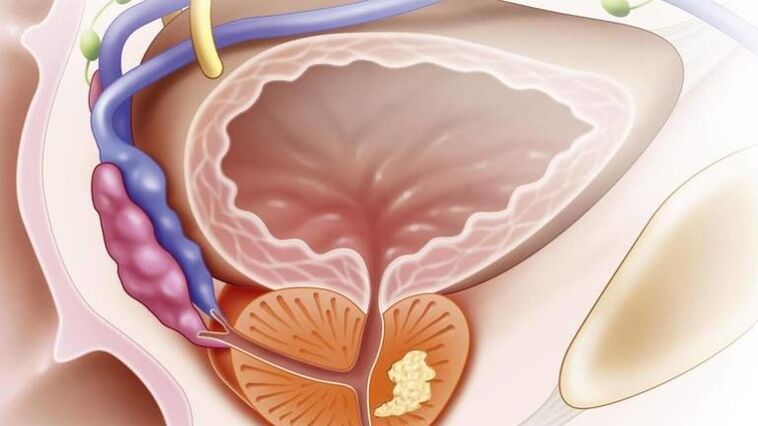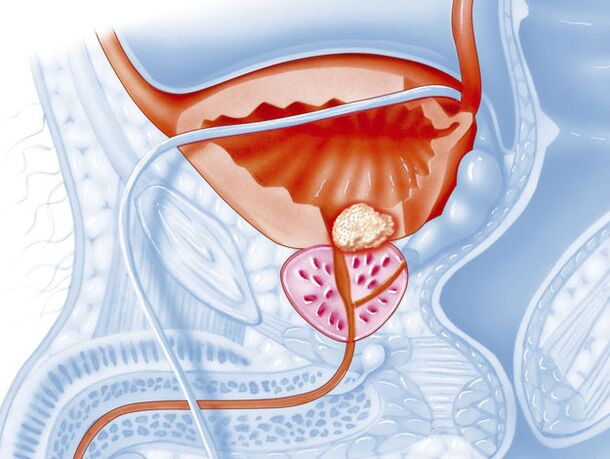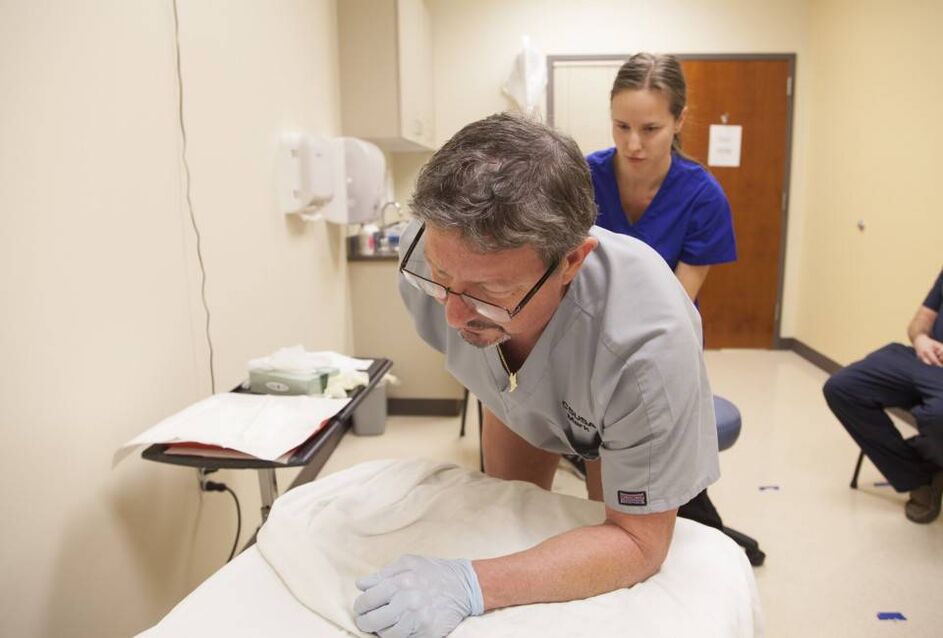Prostatitis nowadays is a leading place among Genitourinarinal System's diseases in men over forty years old.The disease is usually diagnosed at a more mature age, but the modern pace of life contributes to the fact that pathology is often found in a juvenile.There are many causes of the disease, but it is necessary to treat chronic prostatitis in men.The doctor should choose the medicines based on the results of the tests.Only the complex therapy that is provided in time helps to stop the disease.
Chronic prostatitis
Reasons

Prostatitis is a disease characterized by the development of the inflammatory process of the prostate.The disease usually provokes pathogenic microbes that come from the urethra, bladder, intestine or blood flow, lymph.The infection provokes inflammation.In fact, there are many reasons for the development of prostatitis.The predisposing factors are as follows:
- constant constipation;
- Body hypothermia;
- sedentary lifestyle;
- Sppp or urological pathologies;
- chronic diseases in the body;
- abstention from sexual relationships or vice versa many sexual contacts;
- violation of the immune system;
- Voltage.
Type
Chronic prostatitis can be different:
- bacterium;
- with latent, chronic pain in the pelvic region;
- asymptomatic inflammatory;
- stagnant.
Before prescribing medicines to treat chronic prostatitis in men, the doctor should bring a kind of pathology and know the reason for its appearance.
The bacterial form of the disease
In this case, prostatitis develops due to bacterial infection in the gland.As a result, the organ begins to become inflamed, and the pathogenic microbes are actively multiplied.

A latent form of prostatitis
This is characterized by pelvic pain for a long time.The disease can be inflammatory and non -inflammatory.The symptoms are missing, the pathology is hidden.
Asymptomatic prostatitis
The disease is severely diagnosed because it is asymptomatic for a long time.The pathology is observed in a third part of men with prostatitis.During the examination, it is accidentally diagnosed with another occasion.The cause of the disease is unknown.
Stagnant prostatitis
The cause of the disease is the stagnant process of the gland.This is a non -infectious disease.There are many reasons for development:
- injuries to the pelvis or spine;
- Abnormal structure of vessels of the genitourinary system;
- Abnormal development of intestines and bladder;
- abstinence or multiple sexual relationships;
- inactive lifestyle;
- metabolic disorder;
- body poisoning;
- Disease of the muscle bone system.
Diagnosis
To determine the treatment of chronic prostatitis, the doctor should examine the person and find the cause and form of the disease.First, the doctor studies anamithesis and performs an examination and tests the body.He takes the secret of the prostate for research.Laboratory testing of trust, blood and urine can also be prescribed.
When examining the secrets of the gland, the sensitivity of pathogenic microbes over various antibacterial drugs.Without this, it is impossible to prescribe effective drugs for chronic prostatitis.
Treatment
The chronic form of the disease has long periods of remission and relapse periods.But this disease is cured by urologists, but only if the disease does not work.But even in severe cases, the condition of the patient can be alleviated and the disease should be turned into a remission phase.

You also need to follow your doctor's recommendations to fulfill all your appointments without this one will not be able to cure a chronic disease.Treatment gives difficult and long but positive results.
In urology, many groups of drugs are used for treatment for this form of disease.In this case, the treatment should be complicated.The following groups of drugs emphasize:
- antibiotics;
- non -steroid anti -inflammatory drugs (NSAID);
- hormones;
- alpha blockers;
- Antispasmodes;
- BIO regulatory peptides;
- muscle lakes;
- Fito drugs.
Antibacterial drugs
Preparations for the treatment of chronic prostatitis should contain antibiotics.This is necessary for suppressing the pathogenic microflor.The doctor prescribes the medicine based on the results of the tests.
These drugs eliminate the cause of the disease.Nowadays, several groups of antibacterial drugs are used in urology.
Penicillinum group
These drugs are often used because they are characterized by high bioavailability, a spectrum of extensive effect, resistance to the acidic environment of the stomach, and the lowest toxicity of all existing antibiotics.Proper use of the drug eliminates the risk of side effects.
All the drugs of this group can be combined with other drugs.By combining other antibiotics, penicillins weaken.
Cephalosporins
Such drugs for chronic prostatitis can be used by the third and fourth generations.Such drugs are widely distinguished, with great resistance to beta-lactamases compared to the drugs of the penicillin group.
Aminoglycosides
In general, these are natural antibiotics and have antimicrobial effects on active and inactive bacteria.The higher the concentration of active substance in the blood, the stronger the drug.The drugs of this group are characterized by lack of allergic reactions, low toxicity levels, but high Nephro -toxicity.Therefore, the doctor should be correctly calculated before appointing the product.
Fluoroquinolons
The preparations in this group are different from all other antibiotics, their structure and origin.They have no natural analogues and are used in serious cases of the disease when other drugs have proven ineffective.The drugs are represented by four generations.
Macrolides
Such drugs for chronic prostatitis are the most poisonous.This antibiotic group is the safest.The drugs are well tolerated by all patients, and the side effects do not usually occur.Tissues accumulate in high concentrations and are therefore effectively treated for the treatment of prostatitis of any form and severity.
Anti -inflammatory drugs (NSAID)
The purpose of this group is to stop pain and to reduce inflammation of the gland.
Hormonal drugs
These drugs are rarely prescribed, usually only if NSAIDs do not produce the necessary effect.
Alpha -blockers
Such drugs contribute to relaxation of the urethral muscle tissue, which leads to an improvement in urine outflow.These drugs do not treat the disease, but eliminate its symptoms, especially in the urination delay in acute or chronic form.
Spasmolytic
These drugs eliminate blood vessels, improve blood flow, eliminate pain, and improve the outflow of prostate secretion.Such funds are usually used for two to five days.
Muscle Looster and Organic Regulatory Peptides
Medical treatment of chronic prostatitis in men allows such drugs to relieve muscles in the sexual area, eliminate pain, normalize the function of urine selection, normalize iron metabolic processes, and accelerate prostate tissue regeneration.
Phytotherapy
Such drugs for such chronic prostatitis are presented in the form of capsules or solutions.
Other methods of treating prostatitis
In addition to medication, the prostate gland massage, immunomodulators and physical activity should be taken.The doctor may prescribe physiotherapy activities to normalize the functionality of the gland.You also have to eat well.The doctor tells you what diet you need to stick to.Only an integrated approach helps to get rid of chronic prostatitis.This disease is treated for a long time, but for every appointment, it can get rid of it forever.In severe cases, it is possible to achieve extended remission.
Remember!Prostatitis was treated with elemental treatment
Any physician offers many ways to treat prostatitis, from trivial and ineffective to radical:
- Can regularly pass through a tablet and rectal massage, returning every six months;
- You can trust folk cures and believe in a miracle;
- Go to the operation and forget your sex life ...
























